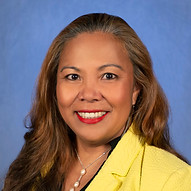
PRESIDENT'S MESSAGE
A Message from CMC President, Ma Bernadette Andres-Salgarino, Ed.D., NBCT
June 2024


Dear CMC Family,
Pride and Progress in Mathematics Education
As we celebrate Pride Month this June, the California Mathematics Council (CMC) reflects on the vital intersection of mathematics education and LGBTQ+ inclusion. We believe all students, regardless of sexual orientation or gender identity, deserve the opportunity to excel in a rigorous and supportive mathematics environment. This vision drives our commitment to:
-
Excellence in Teaching: Upholding high standards in mathematics instruction
-
Effective Communication: Advocating for key issues in mathematics education
-
Diversity and Inclusion: Fostering a welcoming environment for all
Shattering Stereotypes
Traditionally, educators have seen STEM fields as exclusive to heterosexual males (Hall and Francaise 2023). Historically, LGBTQ+ students lacked a sense of belonging in mathematics education. Fortunately, this narrative is shifting (Voigt 2022).
Today, some of the most renowned mathematicians in the world are members of the LGBTQ+ community, and their stories are now part of the curricula in colleges and universities. Organizations such as LGBTQ+ STEM and 500 Queer Scientists highlight the profound impact LGBTQ+ individuals have had on teaching and education in mathematics.
From Exclusion to Expression
As we celebrate Pride Month, I encourage you to explore Spectra: the Association for LGBT Mathematicians. This organization emerged from the need for recognition and community among gender and sexual minority mathematicians. It is a vital resource for our community and continues to grow and evolve.
In the past, LGBTQ+ mathematicians faced significant discrimination and were often unable to form supportive groups. Today, they can freely express their identities, organize events, and showcase their contributions to mathematics. Our progress in recognizing and celebrating LGBTQ+ mathematicians is a testament to the importance of diversity and inclusion in our field.
For those interested in further resources, companies increasingly use the ALBA Network, which offers GSD-inclusive forms to gather demographic information in settings like conference registrations and job applications. This practice is essential for improving diversity and inclusion, allowing us to address underrepresentation with targeted affirmative actions.
Fostering Inclusive Practices
The CMC is committed to aligning its actions with its vision and goals:
-
Professional Development: We will offer resources highlighting the contributions of LGBTQ+ mathematicians, fostering inclusivity for educators and students.
-
Advocacy and Awareness: We continue to advocate for inclusive policies and practices in mathematics education. By raising awareness about LGBTQ+ experiences in STEM, we can create a more equitable learning environment.
-
Leadership Opportunities: We will strive to increase LGBTQ+ representation in leadership roles within CMC and the broader mathematics education community.
Data for Positive Change
While celebrating progress, we acknowledge the need for more data to understand LGBTQ+ experiences in mathematics. Meaningful data collection on sexual orientation and gender identity (SOGI) is crucial, but we must gather this data thoughtfully and ethically, prioritizing the safety and privacy of LGBTQ+ individuals. We can use this data to help understand the ways individuals and subgroups move and persist through STEM pathways. Although the information itself is not a solution, we can use the survey data to advocate for LGBTQ+ representation and inform policies that create a welcoming and supportive environment for everyone in mathematics. Collecting demographic data in ways that are fully intersectional and inclusive is an important step toward (1) asserting the legitimacy of LGBTQ+ identities and highlighting their presence, (2) understanding their STEM career pathways, (3) effectively allocating resources to address disparities, and developing data-driven policies to improve LGBTQ+ STEM environments (Coffield 2024).
Resources for Continuous Learning
-
500 Queer Scientists: A visibility campaign for LGBTQ+ people and their allies working in STEM and STEM-supporting jobs (https://500queerscientists.com/)
-
ALBA Guidelines for Designing Inclusive Forms for Gender and Sexual Diversity (https://www.alba.network/GSDinclusiveforms)
-
LGBTQ+ STEM: Improving LGBTQ+ visibility in Science, Technology, Engineering and Mathematics (https://lgbtqstem.com/)
-
National Center for Science and Engineering Statistics: A Public Guide on NCSES’s Efforts to Measure, Track, and Report Sexual Orientation and Gender Identity (https://ncses.nsf.gov/138/assets/0/files/ncses-sogi-faq_formatted-508-2.pdf)
-
Spectra: Association for LGBT Mathematicians: LGBTQ+ mathematicians and their allies (https://www.lgbtmath.org/)
-
The Queer Mathematics Teacher; Mathematical Queeries: A hub of free Queer Mathematics Teacher (QMT)-created mathematics activities. Use the searchable database provided to find an LGBTQ+ culturally responsive mathematics task. All tasks created by QMT are free to download and access (https://www.thequeermathematicsteacher.com/mathematical-queeries/).
Together We Rise
By working together, we can ensure that mathematics is a welcoming and inclusive field for all. Let’s continue to support and celebrate our LGBTQ+ colleagues and students, recognizing their incredible contributions. Fostering inclusivity ensures everyone can thrive and innovate in the world of mathematics.
Happy Pride Month!
Sincerely,
Dr. Ma Bernadette Andres-Salgarino, NBCT
President, California Mathematics Council (CMC)
References
Coffield, Shane. 2024. “Supplementary Resources to Accompany Improving Data and Policies to Support LGBTQ+ People in STEM.”
University of Maryland. https://docs.google.com/document/u/2/d/e/2PACX1vTwyMOJ1sqWRZpLczTzzpqo7dB3OSpD6lSXX6ygUwvM2_VeZ4IVR_NJaT0YUj-2mtrrILOVvEwToruK/pub#h.545b5m4bj1xr
Hall, B. and M. Francaise. 2023. “LGBTQ+ in STEM: Fostering Inclusion and Resolving Disparities Using Demographic Data.” Panel
Transcript. Columbia University.
Voigt M. 2022. “A Quantitative Exploration of Queer-Spectrum Students’ Experiences in Introductory Undergraduate Mathematics
Courses.” National Library of Medicine.


